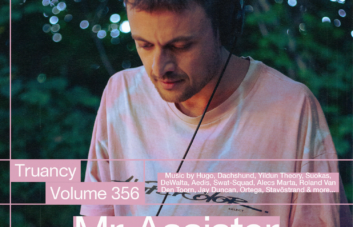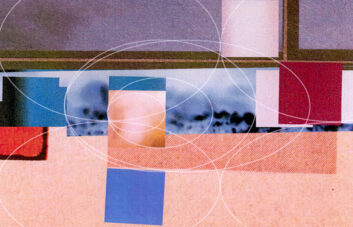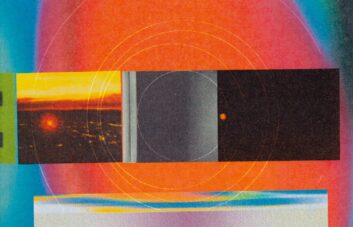Elysia Crampton’s Demon City diverges from the bittersweet warmth of previous releases, instead offering up a collection of tense and often unsettling collaborations. Tracks like “Fire Gut”, released under her previous moniker E+E, were overwhelming in their emotional depth – immersive like a salt bath. Meanwhile, 2015’s American Drift was characterised by melancholic synths weaved between slow, mournful rhythms and a multitude of voices – screaming, heckling, muttering, Lil Jon whooping, etc.
By contrast, the Demon City opener “Irreducible Horizon” puts the listener on notice with a sparse, dissonant piano that rings out over clips of menacing laughter and rolling snares. The laughter remains throughout, used to rhythmic effect on percussion workout “Dummy Track”, whilst the outlandish synth-sax of “Children of Hell” is almost drowned out by demonic howling. All appropriate, maybe, for an artist who, in an interview for Resident Advisor, spoke of an essential “clowniness” at the heart of what she makes.
The Virginia-based producer has dubbed the record a document of what she terms the ‘Severo’ style, described as the ongoing process of ‘becoming-with’. “This term specifically references archivist and activist Che Gossett’s positing of ‘becoming-with’ as a means of worlding,” she writes via email, “a process acknowledging abolition as the unfinished project of ending racial capitalism, policing, and colonialism.”
Collaboration is key in this respect: as Crampton writes in the notes accompanying Demon City, the idea of ‘becoming-with’ is only made possible by the “family-networks and communities that have inspired and sustained our survival.” In keeping with the importance of community, the record features joint productions with producers Rabit, Why Be, Chino Amobi and Lexxi, with the latter also contributing a solo track of his own.
Compared with some earlier work, particularly under the E+E moniker, Demon City features some relatively precise and compact compositions. Did anything in particular prompt this? “I enjoy contradicting myself. When my first album was released, I felt I had to flex and overcompensate for not having an education and for not having any experience with being an expert at anything, such as sound engineering, recording, writing, etc. I said a lot of shit in an effort to validate the work, which was already a few years old by the time it was released.”
Is there any continuity between Demon City and American Drift? One thing that grabs me on both is the heavy use of different audio-stamps. “I think I’m a storyteller first and foremost. To me, both albums simply represent different stories, or different moments in a nonlinear perspective of space and time. That sort of feels like an oversimplification at the moment, but there you go.
I like working on my signatures. My hand-written signature is not that great, but with sound, I can elaborate a little more. As a kid, some of my best friends were into tagging and throw-ups. Maybe some of it comes out of that visual culture, because it’s the same friends that first taught me how to mix and bend pitch.”
You previously described the record as an ‘uneducated and messy’ critique of the state, which might seem a little surprising given the academic way in which you regularly discuss your music. “Besides my own love of history and theory, I think resorting to the language of the university was a way of trying to get intelligent people to engage with my work. I’m still aware my own ability to theorise my own work – or anything else, for that matter – is limited, crude, and unsubstantial. However, I hope to inspire others with that capacity to approach my music in such a way, because I think music is the strongest language I have to offer at the moment. That’s when compared with English, Spanish, visual signals / economies, or even chemical or tactile signals – I think I’m terrible when it comes to touch and smell, for example. I learn new things all the time by allowing myself to communicate my emotions and anxieties through music.”
Like all your music, Demon City has an intense political dimension, as outlined in your description of ‘Severo’, but certain ambiguities remain. Do you see a danger in being explicit, or tying up your work with something hyper-specific? “It’s a give and take sort of thing, and I’m not sure if ‘danger’ is the correct term here. I like leaving things open because it allows a very important element of play, something that gives others space to be creative with and within work that is already considered fully-formed. The term ‘pluripotency’ comes to mind here, but it’s more than that.
As I like to say, I really didn’t want to produce a description for that term from the jump. The ‘we’ is our existence as non-sovereign, non-individuated things, for example our family, friends and ancestors, but also the non-human family that sustain us on this earth, such as fungi, biota and other organisms that live within and around what we define as ‘I.’ One should remember here that, historically speaking, the non-human encompasses human life as well, concerning those ancestors and family members that weren’t and still aren’t counted as human within our colonial society, per sovereignty’s horizon line.”
You’ve also talked about space as violent and non-inclusive in the wake of Demon City, and I wondered if through this record you’re commenting further on your relationship with the club? “I’m tired of considering my relationship with the club. I have friends that work hard in the club, and, as a musician, I’m happy to go anywhere I’m invited and paid to go. It’s very easy to pretend to be a realist and say ‘there is no space that’s free of violence’, because birth is violent, because becoming is violent. But growing older, and as I continue to understand my own irreducibility to coloniality, I wonder how much this understanding of violence as ‘constitutive’ or ‘necessary’ comes out of that very colonial horizon.
Take for instance all the text written on what we call the Jurassic or Cretaceous periods, or what we consider primeval in general. Almost every story I’ve ever read, fiction or nonfiction, has this barbaric, ruthless concept of organisms living in those time periods. But who’s to say that the dinosaurs and other life forms didn’t invent or develop their own ethics? Who is to say that much like birds, their apparent relatives, the dinosaurs didn’t master song and use it as a means to communicate and tell stories, or even establish things like morality, which historically is tied to music and storytelling? They certainly lived long enough for one to logically consider the possibility. So much of how we look at and acknowledge not just history but life itself is based on the formation of the colonial sovereign subject, which is so, so narrow.”
Elysia Crampton presents Demon City is out now on Break World Records. Buy direct from the label here.




